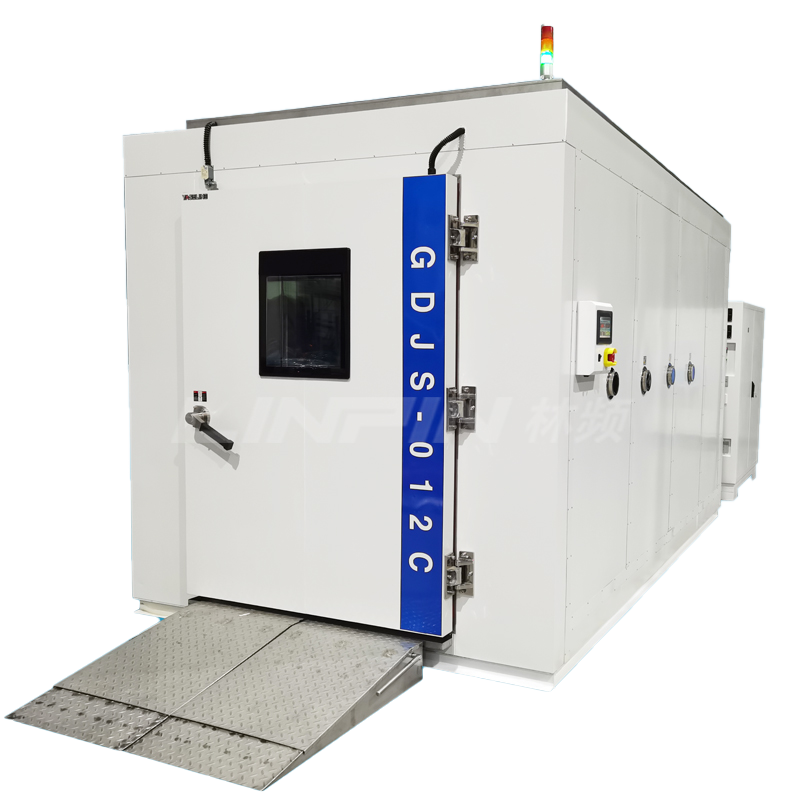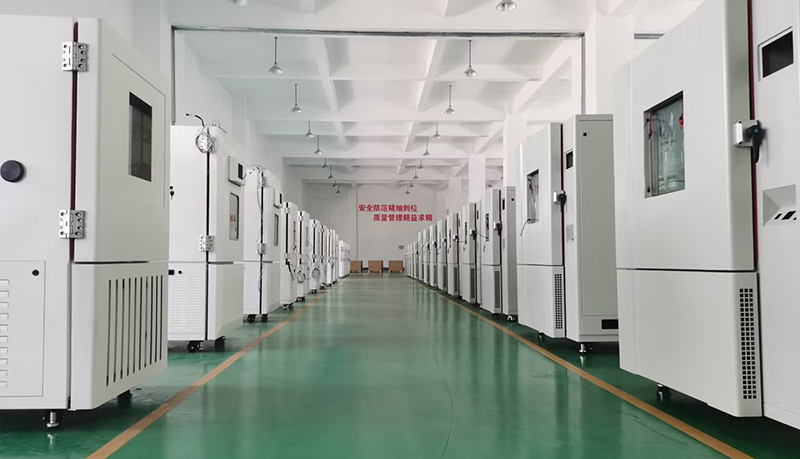<strike id="00ggy"></strike>

The constant temperature and humidity test chamber, also known as a constant temperature and humidity tester, constant temperature and humidity experimental box, constant temperature machine, or constant temperature and humidity box, is a device used to test the performance of materials under various environmental conditions and to evaluate their resistance to heat, cold, dryness, and humidity. It is suitable for quality testing of products in industries such as electronics, electrical appliances, communications, instruments, vehicles, plastic products, metals, food, chemicals, building materials, medical, and aerospace. It complies with standards such as GB/T5170.5-2008, GB/T10586-2006, GB/T2423.1-2008 Test A, GB/T2423.2-2008 Test B, GB/T2423.3-2006 Test Ca, and GB/T2423.4-2008 Test Db.
Chinese Name: Constant Temperature and Humidity Test Chamber
Alternative Name: Programmable Constant Temperature and Humidity Test Chamber
Humidity Range: 20~98%RH
Temperature Range: -60℃~150℃
Technical Specifications
Temperature Range: -70℃~180℃
Humidity Range: 20~98%RH (at temperatures of 20℃~85℃)
Temperature Uniformity: ≤2℃ (under no-load conditions)
Humidity Uniformity: +2、-3%RH
Temperature Fluctuation: ±0.5℃ (under no-load conditions)
Humidity Fluctuation: ±2%
Temperature Deviation: ±2℃
Humidity Deviation: ±2%
Cooling Rate: 0.7~1.5℃/min
Heating Rate: 1.0~3.0℃/min
Time Setting Range: 1~9999H
Humidity Alternation Range: 20~98%RH
Model Distinctions
Constant temperature and humidity test chambers can be divided into “bench-top” and “floor-standing” types, primarily differing in the temperature and humidity ranges they can achieve. Floor-standing models can achieve low temperatures below ambient temperatures and dry conditions, while bench-top models are limited to temperatures above ambient and high humidity conditions.

Bench-Top Model
The bench-top constant temperature and humidity test chamber is an essential testing device in fields such as aviation, automotive, home appliances, and research. It is used to test and determine the parameters and performance of electrical, electronic, and other products and materials under temperature and humidity environmental changes.
Box Material: Machined with CNC machine tools, featuring an aesthetically pleasing design.
Outer Box: A3 steel plate with spray coating.
Controller: Microcomputer temperature and humidity controller, reliable temperature and humidity control.
Observation Window: Large observation window with lighting, double-layer glass for clear visibility.
Safety Features: Independent over-temperature alarm system.
Test Hole: 50mm diameter test hole on the left side of the box.
Mobility: High-quality PU casters with fixing function.
Performance Indicators
Temperature Range: RT+10℃~100℃
Humidity Range: 80~98% R·H
Fluctuation/Uniformity: ≤±0.5℃ /±2℃
Humidity Deviation: +2%、-3%R·H
Heating Time: Room temperature~100℃ in about 20 minutes
Control System
Controller: Imported microcomputer integrated temperature and humidity controller (humidity displayed directly as a percentage).
Precision Range: Setting precision: temperature ±0.1℃, humidity ±0.1%R·H; indication precision: temperature ±0.1℃, humidity ±0.1%R·H.
Temperature and Humidity Sensors: Platinum resistance PT100Ω.
Heating System: Fully independent system, nickel-chromium alloy electric heating element.
Humidification System: External isolation type, full stainless steel boiler-style shallow surface evaporation humidifier.
Circulation System: Noise-resistant temperature air-conditioning type motor, multi-blade centrifugal fan.
Bench-Top vs. Floor-Standing Differences
Equipment Appearance: Bench-top is table-type; floor-standing is floor-type.
Temperature Range:
Bench-top: RT+10℃~100℃
Floor-standing: 0℃~100℃
Humidity Range:
Bench-top: 85~98% R.H
Floor-standing: 30~98% R.H.
Control Instrument:
Bench-top: Domestic digital display Yuyao meter
Floor-standing: Japanese Yoyikong meter
Basic Knowledge
The constant temperature and humidity test chamber is used to test the performance of materials under various environmental conditions and to evaluate their resistance to heat, cold, dryness, and humidity. It is suitable for quality testing of products in industries such as electronics, electrical appliances, communications, instruments, vehicles, plastic products, metals, food, chemicals, building materials, medical, and aerospace.
The structure of the constant temperature and humidity chamber is generally made of steel plates painted or SUS 304# stainless steel with a textured finish for the outer box; the inner box is made of SUS 304# 8K mirror-finish stainless steel. The insulation layer is made of polyurethane foam, which is lightweight, durable, and corrosion-resistant. The box door is sealed with magnetic strips, offering an aesthetically pleasing design and high-precision temperature control.
The chamber is equipped with a closed refrigeration unit, operates smoothly with low noise, and uses stainless steel finned heating tubes for heating air. It also features French (Taylor) fully enclosed compressors. The control instrument is imported, with high-precision P.I.D control to eliminate long-term instability issues.
Working Principle
The constant temperature and humidity test chamber consists of temperature adjustment (heating and cooling) and humidification systems. A rotating fan installed at the top of the box circulates air to balance temperature and humidity within the chamber. Temperature and humidity sensors collect data, which is transmitted to the temperature and humidity controller (microprocessor) for processing and adjustment.
Temperature regulation is achieved through air heating units or refrigeration electromagnetic valves, while humidity regulation is achieved through water tank heating elements or refrigeration electromagnetic valves. The chamber also includes multiple safety features, such as over-temperature protection, automatic power-off for heating elements when fans stop, and shutdown of the refrigeration system when humidity is too high.

Environmental Conditions
Temperature: 5℃~+35℃ (average temperature ≤28℃ within 24 hours)
Relative Humidity: ≤85%RH
Air Pressure: 86kPa~106kPa
Power Supply: Three-phase four-wire + protective ground, voltage range: AC (380±38)V
Frequency: (50±0.5)Hz
Protective Ground Resistance: <4Ω Requirements: Users must install an independent air or power switch of appropriate capacity for the device. Cooling Rate Distinctions Constant temperature and humidity test chambers have different cooling rates: standard, linear, and non-linear. Standard cooling rates are generally 0.7℃~1℃ per minute. Linear cooling refers to uniform cooling rates throughout the process, while non-linear cooling rates are faster at the beginning and slower as the target temperature is approached. Linear cooling rates can be (5℃/10℃/15℃/20℃/25℃)/minute, while non-linear cooling can reach up to 30℃/minute. Display Display: Imported brand temperature and humidity instruments, 5.7-inch high-definition color LCD touch screen. Real-time Monitoring: Monitors controller real-time data, signal point status, and actual output status. Curve Recording: Stores up to 600 days of historical data (24-hour operation, recording interval >1 minute, simultaneous recording of temperature and humidity data). Data can be replayed and uploaded.Data Export: Data can be exported via U盤 and viewed on a computer or converted into Excel format.
Controller Ports: Equipped with RS232/485 ports.
Automatic Calculation: Automatically corrects temperature and humidity conditions for more stable control.
Product Specifications
Temperature Range: 0、-20℃、-40℃、-60℃、-70℃~+100℃(+150℃)
Temperature Uniformity: ±2℃ (under no-load conditions)
Temperature Fluctuation: ±0.5℃ (under no-load conditions)
Humidity Range: 20%~98% RH (at temperatures of 25℃~80℃)
Humidity Deviation: +2、-3% RH
Heating Rate: 1.0℃~3.0℃/min
Cooling Rate: 0.7℃~1.0℃/min
Time Setting Range: 1~9999 hoursSelection Guide
When selecting a constant temperature and humidity test chamber, consider the following:
Sample Size: Ensure the sample volume does not exceed 20-35% of the chamber’s effective working space.
Temperature Range: Choose from standard ranges (e.g., 0℃~100℃, -20℃~150℃, -40℃~150℃, -70℃~150℃) or custom options.
Cyclic Function: Determine if the device supports temperature cycling.
Humidity Function: Check if the device includes humidity control (20%~98% RH at 20℃~85℃).
Control System Hardware: Select based on operational needs, cost, and performance.
Structural Features
The device is made of high-quality materials and processed with advanced equipment. The exterior is treated with spray painting for an attractive and durable finish. The inner chamber is made of imported stainless steel, ensuring longevity. The design is practical and easy to control, with minimal maintenance required.
Device Features
Advanced Refrigeration System: Imported fully enclosed compressors, environmentally friendly refrigerants (R507, R404A, or R23), and high-efficiency heat exchange systems.
Custom Controller: LED LCD touch screen with intuitive interface.
Observation Window: Large, clear observation window with lighting.
Uniform Air Distribution System: Reliable and uniform air distribution.
Stable Water Circulation System: Ensures consistent water and air pressure.
Material Options: Stainless steel or static spray finishes.
Software Integration: Optional software for controlling multiple devices from one computer.
Low Noise: Optimized design for quiet operation.

Control System
The controller uses advanced fuzzy algorithms for precise control, automatically adjusting refrigerant flow to manage heat loads effectively. Features include:
Energy-saving mode with 20% power savings.
7-inch full-color LED touch screen.
User-friendly interface.
Simple operation mode.
Programmable settings.
Large program capacity (100 programs, 1000 segments).
Long cycle duration (32,000 cycles).
Extended constant time settings (1 minute to 999,999 hours and 59 minutes).
Heating System
Heating is achieved with far-infrared nickel-chromium alloy heating elements. The high and low-temperature systems are completely independent. Temperature control uses P.I.D + S.S.R system coordination for high precision and efficiency.
Refrigeration System
The refrigeration system uses imported compressors in a cascade configuration to meet cooling rate and temperature requirements. It features energy regulation technology to optimize performance and reduce operating costs.
Energy-saving Design
Refrigerant flow regulation.
Gas-liquid bypass regulation.
Evaporation temperature regulation.
Smart expansion valve system.
Automatic power matching for heating and cooling.
Definition
The constant temperature and humidity test chamber is suitable for quality testing of products in industries such as electronics, plastics, electrical appliances, instruments, food, vehicles, metals, chemicals, building materials, aerospace, and medical. It tests materials’ resistance to heat, cold, dryness, and humidity. The device features a user-friendly interface with touch screen controls and automatic fault alarms.
Device Features
Aesthetic Design: Rounded corners, mist-textured surface, CNC machined, and reliable handles.
Observation Window: Large, double-layer glass with lighting and anti-fogging.
Sealing: Double-layer gas-tight seals.
Water Supply System: External water supply for easy replenishment.
Refrigeration System: Imported compressors and environmentally friendly refrigerants.
Controller: Korean TIME880 touch screen with fault alerts.
PID Control: Automatic calculation for stable control.
Safety Features: Over-temperature protection and fault alerts.
Data Recording: Optional recorder.
Remote Monitoring: Data can be viewed on a computer.
Multi-segment Programming: Flexible control options.
Mobility: Casters for easy movement.
Safety: Independent over-temperature alarm system.
Test Hole: 50mm diameter on the left side.
Material: Inner chamber in imported stainless steel, outer chamber in A3 steel with spray coating.
Standards Compliance
The device meets standards such as GB11158, GB10589-89, GB10592-89, GB/T10586-89, GB/T2423.1-2008, GB/T2423.2-2008, GB/T2423.3-2006, GB/T2423.4-2008, GB/T2423.22-2002, IEC60068-2-1.1990, IEC60068-2-2.1974, GJB150.3, GJB150.4, and GJB150.9.

Prohibited Items
Explosives, flammable materials, corrosive substances, and gases are prohibited.
Troubleshooting
Common issues and solutions include:
No Power: Check power cord and fuse.
Temperature Not Rising: Adjust settings or replace controller/heater.
Poor Cooling: Check refrigerant levels or contact service.
Compressor Not Working: Check voltage or contact service.
Model Explanation
HS: Represents the constant temperature and humidity test chamber.
Controller: Programmable touch screen.
Humidity Range: 30%~98%RH.
Temperature Precision: 0.1℃.
Humidity Precision: 0.1%RH.
Humidity Uniformity: +2%、-3%R·H.
Temperature Accuracy: ±2%℃.
Ramp Rate: 0.7℃~1.5℃ per minute (non-linear, no-load average).
Control Method
Balanced temperature and humidity control system (BTHC) using P.I.D control of SSR to balance heating and humidification with losses, ensuring long-term stable operation.
Applications
The device is suitable for testing the performance of aerospace products, electronic instruments, materials, electrical products, and components in humid and hot environments.
Device Structure
Inner Chamber: Imported SUS304 stainless steel mirror plate or 304B argon arc welding.
Outer Chamber: A3 steel plate with spray coating.
Controller: Microcomputer temperature and humidity controller.
Observation Window: Large window with lighting and double-layer glass.
Safety Features: Independent over-temperature alarm system.
Test Hole: 50mm diameter on the left side.Slow Cooling and Solutions
If the chamber exhibits slow cooling, check if it has been operating at low temperatures for extended periods. Perform a drying process at 60℃ for about 30 minutes before opening the door.
Calibration
Domestic authoritative third-party calibration units use the 9-point temperature and humidity calibration method to inspect uniformity and deviation within the chamber, issuing calibration reports annually.
Standards Compliance
The product meets national standards such as GB/T2423.1-2001, GB/T2423.3-1993, GB/T2423.2-2001, and others.
Selection Guidelines
When selecting environmental and reliability test equipment, refer to engineering product test specifications and standards. Ensure the equipment meets calibration regulations for accuracy and reliability.
Selection Principles
Reproducibility: Ensure the device can reproduce environmental conditions within specified tolerances.
Repeatability: Ensure consistent stress levels across multiple tests.
Measurability: Ensure conditions are observable and controllable.
Exclusivity: Exclude non-test environmental factors.
Safety: Ensure reliable operation and safety features.
Classification
Test Type: Humidity 20-98%, high temperatures up to 150℃, low temperatures varying by model.
Culture and Biochemical Type: Temperature 0-50℃, humidity 50-95%, suitable for food and microbial culture.
Usage Environment
Operating Temperature: 0~35℃, optimal performance at 5~25℃.
Installation: On a level surface with 600mm clearance around the chamber.
Controller
Imported Korean controller with LCD touch screen, data logging, and fault alerts.
Humidity Control
Humidity is expressed as relative humidity, calculated using the ratio of water vapor partial pressure to saturated vapor pressure at a given temperature. Methods include spray, steam, and shallow water pan humidification.

Installation Requirements
Clearance: At least 300mm from walls or objects.
Temperature and Humidity: Stable temperature of 15~35℃, relative humidity >85%.
Avoid Sudden Temperature Changes: Install in a stable environment.
Level Surface: Use a level to ensure proper installation.
Avoid Direct Sunlight: Install in a shaded area.
Ventilation: Ensure good airflow.
Safety: Away from flammable, explosive, or heat sources.
Dust: Install in a low-dust environment.
Power Supply: Close to power source.
Humidity Calculation
The device calculates relative humidity using formulas involving absolute humidity, saturated vapor pressure, and other parameters.
Test Conditions
Test severity depends on temperature grades and duration, with standard temperatures including -65, -55, -40, -25, -10, -5, +5℃, and durations such as 2, 16, 72, 96 hours.
System Components
The chamber includes refrigeration, heating, control, temperature, air circulation, and sensor systems.
Refrigeration System
Modular Design: High efficiency and easy maintenance.
Water and Electrical Separation: Reduces leakage risks.
Environmental Friendliness: Uses DuPont refrigerants.
Protection Mechanisms: Multiple safety features.Key Features
Design: Rounded corners with high-quality appearance.
Observation Window: Triple-glazed with energy-saving lighting.
Separated Systems: Prevents water leakage from affecting electronics.
Reliable Refrigeration: Imported compressors and controllers.
Precautions
Prohibited Items: Explosives, corrosive substances, powders, flammable materials, and gases.
Sample Placement: Follow specific guidelines for distance from walls and volume ratios.
Product Selection
Volume: Ensure sample volume does not exceed 20-35% of chamber capacity.
Clearance: Maintain at least 100-150mm between samples and walls.
Notes
Power Supply: Use within rated voltage range.
Installation: Avoid power connection before setup is complete.
Non-explosion-proof: Do not use in explosive or flammable environments.
Door Opening: Avoid opening during operation; use protective measures if necessary.
Maintenance: Do not disassemble or modify the device.
Linear vs. Non-linear
Linear: Uniform temperature change per minute.
Non-linear: Average temperature change varies over time.

Operation
The chamber operates through three interconnected systems: refrigerant circulation, air circulation, and electrical control.
Selection Considerations
Industrial Applications: Consider industrial constant temperature and humidity air conditioners for high-precision control.
Parameters: Determine airflow, thermal loads, model, condensation method, and air distribution.
Metrological Characteristics
Metrics: Temperature and humidity deviation, fluctuation, and uniformity.
Measurement Points: Vary based on chamber volume (9-15 temperature points, 3-4 humidity points).
Calculations: Fluctuation, uniformity, and deviation based on measured values.
Maintenance
Cleaning: Regularly clean internal and external surfaces.
Humidifier: Replace water monthly and clean the water tray.
Over-temperature Protection: Check settings before operation.
Condenser: Clean monthly with a vacuum or compressed air.
Wet Bulb Cloth: Replace every three months and ensure proper water level.
Selection Factors
Cost-Effectiveness: Evaluate based on technical parameters and reliability.
User Needs: Consider specific testing requirements.
After-sales Service: Ensure timely support and diagnostic capabilities.